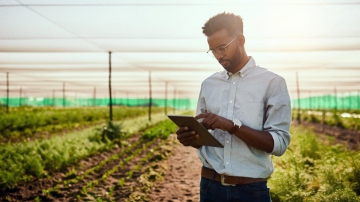EHS industry groups and consortiums are essential towards mitigating the COVID-19 pandemic and its impacts.
The silver lining of a worldwide crisis? When we face a common challenge, we band together.
At Antea Group, we’ve always championed the value of industry events, roundtables and consortiums. They are excellent opportunities to sharpen your mind with fresh ideas, learn from your competitors and peers, and discuss the present and future of the EHS and sustainability industry. This year, coming together is more valuable than ever, even if we can’t do so physically.
For all the difficulties and setbacks this pandemic has brought, it also brings inspirational stories of perseverance and collaboration. The global medical community uniting to fight COVID-19 is a fine example -- when we share our collective knowledge, skills, and resources, we become vastly more powerful in our response to crises and tough situations.
As such, there’s a sense of alliance throughout the EHS and sustainability community -- we are all facing this massive, unforeseen maelstrom of circumstance that has everyone feeling a degree of uncertainty, and we’re all being asked to do more with less.
Now, more than ever, we need to come together. EHS and sustainability industry groups and consortiums provide a practical path for business to do just that.
Here are some examples of organizations and consortiums that can help you maximize operational efficiency and make meaningful progress towards COVID-19 mitigation while sending the right signals to customers, investors, and employees.
9 Key EHS Industry and Sustainability Groups and Consortiums for Collective Adaptation and Advancement
EHSxRetail
Retail EHS is under the microscope right now. Consumers are looking to retail companies for security and peace-of-mind when it comes to shopping at brick-and-mortar stores during the pandemic. C-suites are expecting retail EHS teams to step up to the challenge.
EHSxRetail is an organization in which retail EHS professionals can approach these complex issues as a team while leveraging the collective know-how of the industry towards finding solutions. Angie Dickson Stagg, who leads the group, calls it “a great platform for open discussions and sharing among leaders in the industry and the intimate setting gives the participants a safe environment to learn from each other.”
Beverage Industry Environmental Roundtable (BIER)
BIER is where the world’s beverage leaders gather to tackle the sustainability issues that revolve around their industry. Even though most of the participants are competitors, they are committed to solving sustainability challenges as one -- knowledge is openly shared and practical solutions are co-created. Collaborative efforts like these make all the difference in combating issues that affect us all.
“Sector consortiums like BIER are a powerful and increasingly important vehicle in the sustainability movement,” says Nick Martin, BIER’s Executive Director. "Companies could pursue these efforts independently, but the collaborative outputs are far more advanced, effective, and digestible by key stakeholders.”
EHSxTech
Technology is all about innovation, and during this moment of disruption, bold and innovative thinking is needed more than ever. EHSxTech provides an opportunity for EHS professionals in the tech industry to discuss key topics and trends in a collaborative, non-competitive forum.
What does EHS look like when a majority of people are working remote? How can we best handle issues of compliance? What kind of countermeasures are going to be most effective when people do eventually return to the offices? Right now, there are more questions than answers, but a communal approach among forward-thinking minds certainly helps to close the gap.
One example of a solution that could be broadly applied in response to the pandemic is using safety technology to measure social distance. What other methods and practices could emerge from the coordinated efforts of professionals in the tech space?
“Tech companies pride themselves on unique products, services, and cultures, but it’s amazing how much in common they have when it comes to EHS,” observes Peylina Chu, Director of EHSxTech.
Healthcare Plastics Recycling Council (HPRC)
HPRC aims to bring together leaders in healthcare, recycling and waste management to take down the proliferation of plastics and waste packaging in the healthcare industry. We wrote here recently about how the pressing issue of plastic waste is being exacerbated in healthcare by the pandemic, and its corresponding increased demand for single-use plastics.
Advanced recycling is changing the game, but making it scalable, accessible and efficient requires an aligned commitment from companies and leaders throughout the field. If the healthcare sector can take charge on creating a circular economy for plastic, it will dramatically impact the bigger picture.
Collaboration holds the key.
“Each stakeholder in the value chain has a different perspective, and each HPRC member has had an ‘aha’ moment that would have never been recognized without the collection of people around the table,” says Peylina, who also serves as Executive Director for HPRC.
Consortium to Reinvent the Retail Bag
One of the major culprits in our world’s plastic waste crisis is the abundance of retail bags, which cause a significant environmental impact. The Consortium to Reinvent the Retail Bag has launched the Beyond the Bag initiative as a joint effort between nine partners:
- Managing Partner: Closed Loop Partners
- Founding Partners: CVS Health, Target, Walmart
- Grocery Sector Lead Partner: Kroger
- Supporting Partner: Walgreens
- Innovation Partner: Ideo
- Environmental Advisory Partners: Conservation International, Ocean Conservancy
These various organizations are united behind a shared vision for a waste-free future, advanced by development and implementation of innovative new solutions. It is inspiring to see these traditionally fierce competitors in the retail space joining forces around such a critical directive.
“We have to approach this as an industry,” said Kathleen McLaughlin, executive vice president and chief sustainability officer at Walmart, in a Fast Company article. “Walmart’s not going to figure that out on their own, nor is Target, nor is Kroger.”
Every Bottle Back
In a similar vein to the retail bag consortium, Every Bottle Back seeks to combat the significant issue of plastic bottle waste. A collection of companies, including several Antea Group clients and members of BIER, are coming together to develop new plastic bottle solutions that are 100% recyclable (even the caps!). Additionally, Every Bottle Back invests in infrastructure upgrades, promotes education in communities, and seeks to make recycling more accessible for all.
“We are excited to partner with the leading environmental and recycling organizations to build a circular system for the production, use, recovery and remaking of our bottles,” said said Katherine Lugar, president and CEO of the American Beverage Association, when launching the initiative last year. “Every Bottle Back will ensure that our plastic bottles are recovered after use and remade into new bottles, so we can reduce the amount of new plastic used to bring our beverages to market. This is an important step for our industry, and it builds on our ongoing commitment to protecting the environment for generations to come.”
Transform to Net Zero
Transform to Net Zero is a cross-sector initiative aiming to accelerate the transition to a net-zero global economy. It was founded in 2020 by a coalition of nine organizations -- A.P. Moller – Maersk, Danone, Mercedes-Benz AG, Microsoft Corp., Natura & Co, NIKE, Inc., Starbucks, Unilever, and Wipro -- with the support of BSR.
According to Microsoft, which helped launch the new initiative, “Transform to Net Zero will focus on enabling the business transformation needed to achieve net zero emissions no later than 2050, in addition to driving broader change with a focus on policy, innovation, and finance. The outputs of the initiative will be widely available to all.”
“No one company can address the climate crisis alone,” said Microsoft’s President Brad Smith. “That’s why leading companies are developing and sharing best practices, research, and learnings to help everyone move forward.”
Circular Economy 100
Launched a few years back by the Ellen McArthur Foundation, CE100 rallies many leading organizations from around the world around the vision for a circular economy that disrupts the “take, make, dispose” model. Among the recognizable members of this network: 3M, Amazon, Cisco, HP, Johnson & Johnson, and many more.
“For organisations which embrace the opportunities offered by the circular economy, there are first-mover advantages available,” said Dame Ellen MacArthur, Founder of the Ellen MacArthur Foundation, in announcing the network. “The CE100 USA programme provides key insight to support organisations in their transition, and to help accelerate their rate of circular economy innovation.”
MN Sustainable Growth Coalition
Antea Group recently joined this group of Minnesota agencies and businesses partnering to promote sustainability through our practices and advocacy. The Minnesota Sustainable Growth Coalition collaborates to develop projects and initiatives, share stories, and build a vision for a fully realized circular economy. This coalition is one of the first of its kind in the United States, but hopefully a precursor of things to come as climate change and a global pandemic place new sustainability demands on the business sector.
EHS & Sustainability Professional Organizations and Associations
In addition to the industry groups and consortiums above, which bring various companies together in shared pursuits, there are a number of organizations and associations at the individual level where you can learn and grow with others. Relevant examples during the current climate include:
- National Association for EHS Management: From growing as leaders to embracing new technologies, NAEM empowers EHS and sustainability managers to strengthen their skill sets through benchmarking, networking, and career development opportunities. Their COVID-19 EHS&S resources page is a timely asset for pros navigating the current uncertainty.
- American Society of Safety Professionals: With more than 40,000 members in 80 countries worldwide, ASSP is a powerful community of occupational health and safety pros that’s been around more than 100 years. Check out their COVID-19 Latest Resources for plenty of educational materials and webinars.
- American Industrial Hygiene Association: “Industrial hygiene” might look quite a bit different in the years ahead. Members of the AIHA will be able to follow and adapt to this evolution together. The association’s Coronavirus Outbreak Resource Center may come in handy for you.
- National Environmental Health Association: Driven by a mission “to advance the environmental health professional for the purpose of providing a healthful environment for all,” NEHA seeks to provide education and motivation for its 6,000 members. They too have assembled a helpful COVID-19 resource hub.
Together, we are stronger. Want to know more about industry groups and consortiums that can help your EHS and sustainability team tackle issues with the strength of a community? Contact Antea Group.
Want more news and insights like this?
Sign up for our monthly e-newsletter, The New Leaf. Our goal is to keep you updated, educated, and even a bit entertained as it relates to all things EHS and sustainability.
Get e-NewsletterHave any questions?
Contact us to discuss your environment, health, safety, and sustainability needs today.






